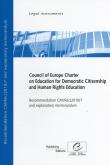What is EDC/HRE
“Human rights education” means education, training, dissemination, information, practices and activities which aim, by equipping learners with knowledge, skills and understanding and moulding their attitudes and behaviour, to empower them to contribute to the building and defence of a universal culture of human rights in society, with a view to the promotion and protection of human rights and fundamental freedoms
Education for democratic citizenship and human rights education (DG Democracy) are closely interrelated and mutually supportive. They differ in focus and scope rather than in goals and practices. Education for democratic citizenship focuses primarily on democratic rights and responsibilities and active participation, in relation to the civic, political, social, economic, legal and cultural spheres of society, while human rights education is concerned with the broader spectrum of human rights and fundamental freedoms in every aspect of people’s lives.
What is the aim of Education for democratic citizenship and human rights (EDC/HRE)?
What is EDC/HRE?
Why do we need EDC/HRE?
How does it help young people?
What about adults?
Many adults have lost interest in what they see as "politics". They are jaundiced by political parties and feel their political representatives are cut off from them and their way of feeling. Yet many people are very interested in the world around them - campaigning for local hospitals, for the environment or against animal cruelty for example. EDC/HRE can help these people to see how they can gain influence in society.
There are other obstacles to people being able to express themselves. Some women do not have the chance to vote or get involved in society because they come from a background where men dominate. Disabled people and older people may be impeded because it is harder to get their voices heard. EDC/HRE works, both to give them confidence and to open the eyes and ears of the rest of society.
Why is the Council of Europe involved?
The Council of Europe is the oldest and biggest European organisation. With 47 member states, it covers almost the whole of geographical Europe and touches the lives of over 800m people living there. The Council is the watchdog for human rights for Europe's citizens, and a guardian of democracy and the rule of law: the best structure to oversee EDC/HRE in Europe.
Some thoughts on Democracy, Human Rights and Education
"If liberty and equality, as is thought by some are chiefly to be found in democracy, they will be best attained when all persons alike share in the government to the utmost." Aristotle (384 BC - 322 BC)
"Education is the most powerful weapon which you can use to change the world." Nelson Mandela
"You have to be the change you want to see in the world". "To safeguard democracy the people must have a keen sense of independence, self-respect, and their oneness." "The spirit of democracy cannot be imposed from without. It has to come from within. In true democracy every man and woman is taught to think for himself or herself". Mahatma Gandhi
"Voting is one of the few things where boycotting in protest clearly makes the problem worse rather than better." Jane Auer, American Author
"The world is a dangerous place, not because of those who do evil, but because of those who look on and do nothing." Albert Einstein
"Responsibility does not only lie with the leaders of our countries or with those who have been appointed or elected to do a particular job. It lies with each of us individually. Peace, for example, starts within each one of us. When we have inner peace, we can be at peace with those around us." The Dalai Lama
Aspects of citizenship
Democratic citizenship is not limited to the citizen’s legal status and to the voting right this status implies. It includes all aspects of life in a democratic society. Democratic citizenship is therefore related to a vast range of topics such as sustainable development, participation of people with disabilities in society, gender mainstreaming, prevention of terrorism and many other areas.



